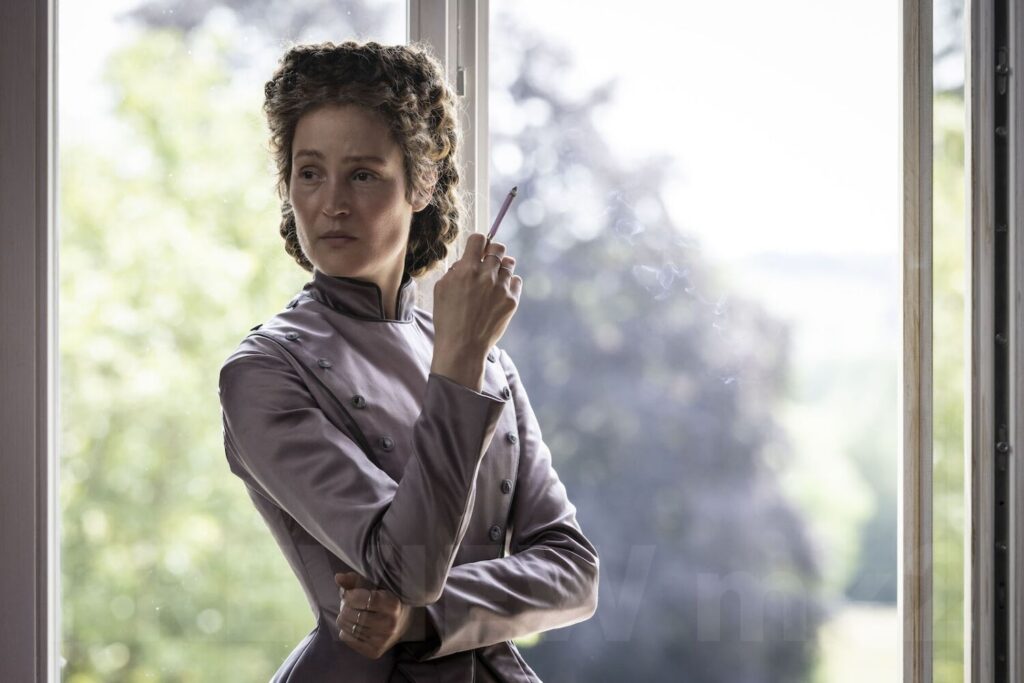A playful elegy for a reluctant royal, writer-director Marie Kreutzer’s “Corsage” — starring a magnetic Vicky Krieps as the 19th century Empress Elisabeth of Austria — is a costumed period portrait freed from the corset strings of history’s more idolizing glare, even as it depicts exactly what all that tightening, pulling and image-handling does to a woman’s sense of personal freedom.
The Princess Diana of her day, swept into stardom by a lavish marriage and subsumed by an unforgiving monarchy’s rules and duties, Elisabeth sought to meet the demands of her era’s fashion-trending expectations with a rigorous beauty regimen that involved regular exercise, a punishing diet (broth and oranges), and maintaining a 19.5-inch waist. Yet she was also a bright, dedicated proponent of society’s human progress, from technical and cultural advancements to the treatment of an unstable empire’s war-wounded and mentally ill. With so fragile a temperament, however, one can guess which sense of purpose won out, and in conjunction with some terrible tragedies, all but confined her to a life of psychological decline.
In the popular imagination of Europe, however, Elisabeth is primarily a fairy-tale figure, most notably depicted as such in the colorfully romantic Austrian “Sissi” films of the 1950s that catapulted a young Romy Schneider to marquee fame and Christmas-viewing immortality. The Elisabeth of “Corsage” is a spiky corrective, however, introducing us to a vinegary sovereign bored by ceremony and driven to distraction, her 40th birthday dramatized as a near-solemn occasion sparking her to muse on how at 40 a person begins to “disperse and fade, darkening like a cloud.”
Her wiry scold of a husband Emperor Franz Joseph (an imperious Florian Teichtmeister) ignores her intelligence, treating her like a disagreeable child, while her teenage son Prince Rudolf (Aaron Friesz) and stiffly poised younger daughter Valerie (Rosa Hajjaj) eye her judgmentally, as if their identities have already been swallowed up by monarchical propriety. That leaves Elisabeth turning instead to riding excursions, impromptu trips, trusted ladies-in-waiting, and longtime companions (including her cousin King Ludwig II of Bavaria) for amusement and resolve. But even rekindling an affair with an English riding instructor (Colin Morgan) is a self-defeating bid for pleasure when their notions of desire don’t mesh (it stops for her at his admiring gaze), leaving fear of recrimination from her family to do the mood-souring rest.
When what she can control about her life and body takes over, “Corsage” segues into a paradoxically prickly and elegant sadness wholly its own, bolstered by cinematographer Judith Kaufmann’s intimately chilly palette. And as Kreutzer showed with her last film, the knockout psychodrama “The Ground Beneath My Feet,” the Austrian filmmaker is brilliantly adept in her compositions and tone at conveying the cracking of a carefully held composure.
Her greatest asset, however, is Krieps, a more than worthy co-conspirator in bringing to life a caged showpiece before carving an artfully fictionalized escape plan from her gilded frame. A swanlike, silent-era-like presence with a vital allure, Krieps is fast proving to be a movie treasure (she was also great in this year’s French drama “Hold Me Tight”), and here the “Phantom Thread” star plays Elisabeth as if preternaturally aware of the maw of history as it relates to male and female legacy, a modern woman trapped in a poisonous time-travel fantasy but refusing to give in without graceful defiance.
To that temporally fluid end, Kreutzer has also seeded the film with historical inventions and anachronistic touches of deadpan insouciance, like suspiciously inauthentic clothing and locations (you can spot a wall telephone), and in two music-filled scenes, chamber performances of Kris Kristofferson’s “Help Me Make It Through the Night” and the Rolling Stones’ “As Tears Go By.” The well-layered score is further augmented by wonderfully resonant, bracketing song selections (of the non-diegetic kind) from Camille and Soap&Skin, whose “Italy” gives anthemic heft to the stirringly conceived closing sequence.
Overall, “Corsage” shows a tantalizing way forward for the hopelessly staid biopic genre: honoring, provoking and upending with verve and humor as it liberates a complex woman from iconography’s deadening glamour.
‘Corsage’
Not rated
In German, French and English with English subtitles
Running time: 1 hour, 54 minutes
Playing: Starts Dec. 30, Laemmle Royal, West L.A.

